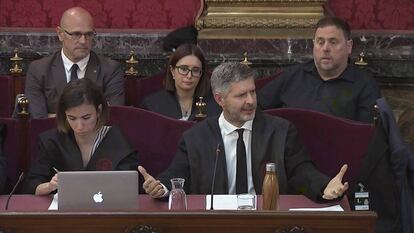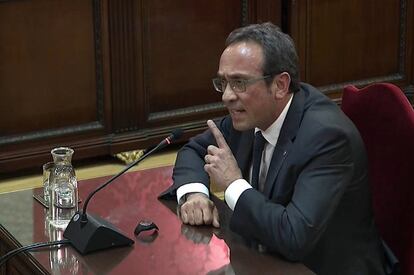Catalan separatists call for “political solution” to crisis on last day of trial
The 12 leaders charged for their role in the 2017 secession bid insisted that their only aim was to give Catalans a chance to express themselves through a referendum

The 12 Catalan separatist leaders on trial for rebellion and other crimes in connection with the unilateral secession attempt of October 2017 made their final statements at the last hearing on Wednesday.
All of them insisted that they are political prisoners on trial because of their ideas. They said their only aim had been to give Catalan citizens a chance to express themselves through a referendum, and called for political dialogue with the central government in Madrid as the only way out of the conflict.
There is no contrition of any kind
Òmnium leader Jordi Cuixart
Catalonia has become a pivotal issue in Spanish politics following the illegal referendum of October 1, 2017, the unilateral independence declaration that followed, and the seven-month suspension of self-government imposed by Madrid.
Spain’s acting Prime Minister Pedro Sánchez of the Socialist Party (PSOE), who won the recent general election but has yet to form a government, has pledged to work toward a solution through dialogue.
The trial of the 12 separatist leaders that ended yesterday at the Supreme Court reflects how deeply divisive the issue has become. After four months of hearings and testimony from around 400 witnesses, neither the accusation nor the defense have substantially altered their original positions.

Prosecutors say the defendants organized a unilateral breakaway plan in deliberate violation of the law and despite reiterated warnings from the courts, hoping to create enough domestic and international pressure to force Madrid into talks.
The accused allegedly tried to liquidate the existing constitutional order, and for this they face charges ranging from disobedience, which entails no prison terms, to rebellion, which could mean more than a decade behind bars. The rebellion charge hinges on whether violence was used during the secession attempt, and this has been a major point of contention throughout the 52 hearings.
A “man of peace”
Oriol Junqueras, a leader of the Catalan Republican Party (ERC) who served as the deputy premier of Catalonia when the breakaway attempt took place, insisted on Wednesday that he is a man of peace.
“My dedication to politics came late in life, out of a desire to serve, to be useful, to build a better world with more freedom in it,” said Junqueras, who faces the highest prison term of any defendant, 25 years. He added that the Catalan independence issue should go back to the field of politics, “which it should never have left.”
It is unfair for this court to have to resolve a political problem
Jordi Sànchez, ex-ANC leader
The other defendants made similar calls. “If we are here today, it’s because politics failed,” said Joaquim Forn, who served as the head of interior affairs in the Cabinet of former Catalan premier Carles Puigdemont – who is not among the leaders on trial as he fled Spain to avoid arrest following the independence declaration of October 2017, and has since settled in Belgium.
Forn was the only defendant who said that if he committed any offenses, it was not his intention to do so. “I categorically deny that my goal was to liquidate the [Spanish] Constitution through violence. I always had a negotiated solution in mind. I may have made mistakes, but at no point did I jeopardize people’s safety,” he said.
No regrets
Others were more defiant, saying they would “do everything I did all over again,” in the words of Jordi Cuixart, leader of Òmnium, a pro-independence association that played a relevant role in the breakaway bid. “There is no contrition of any kind.”
Jordi Sànchez, the former leader of a similar association called ANC, told the panel of justices that politicians should be dealing with this problem, not them. “It is unfair for this court to have to resolve a political problem,” he said. “You cannot resolve it, but you do have a duty not to make the political crisis any worse. I wouldn’t like to be in your shoes.”
Yet others underscored the personal effects of the court’s actions, which include placing several of the defendants in pre-trial custody – on the basis that they presented a flight risk, among other reasons – since as far back as the fall of 2017.
“So far, through your resolutions, you have decided that I may not see my two children, who are 10 and four, grow up,” said former Cabinet member Josep Rull. “But no matter what your verdict is, it will not stop me from leaving them a more valuable legacy: the dignity of legitimate and noble ideas.”
English version by Susana Urra.
Tu suscripción se está usando en otro dispositivo
¿Quieres añadir otro usuario a tu suscripción?
Si continúas leyendo en este dispositivo, no se podrá leer en el otro.
FlechaTu suscripción se está usando en otro dispositivo y solo puedes acceder a EL PAÍS desde un dispositivo a la vez.
Si quieres compartir tu cuenta, cambia tu suscripción a la modalidad Premium, así podrás añadir otro usuario. Cada uno accederá con su propia cuenta de email, lo que os permitirá personalizar vuestra experiencia en EL PAÍS.
¿Tienes una suscripción de empresa? Accede aquí para contratar más cuentas.
En el caso de no saber quién está usando tu cuenta, te recomendamos cambiar tu contraseña aquí.
Si decides continuar compartiendo tu cuenta, este mensaje se mostrará en tu dispositivo y en el de la otra persona que está usando tu cuenta de forma indefinida, afectando a tu experiencia de lectura. Puedes consultar aquí los términos y condiciones de la suscripción digital.








































